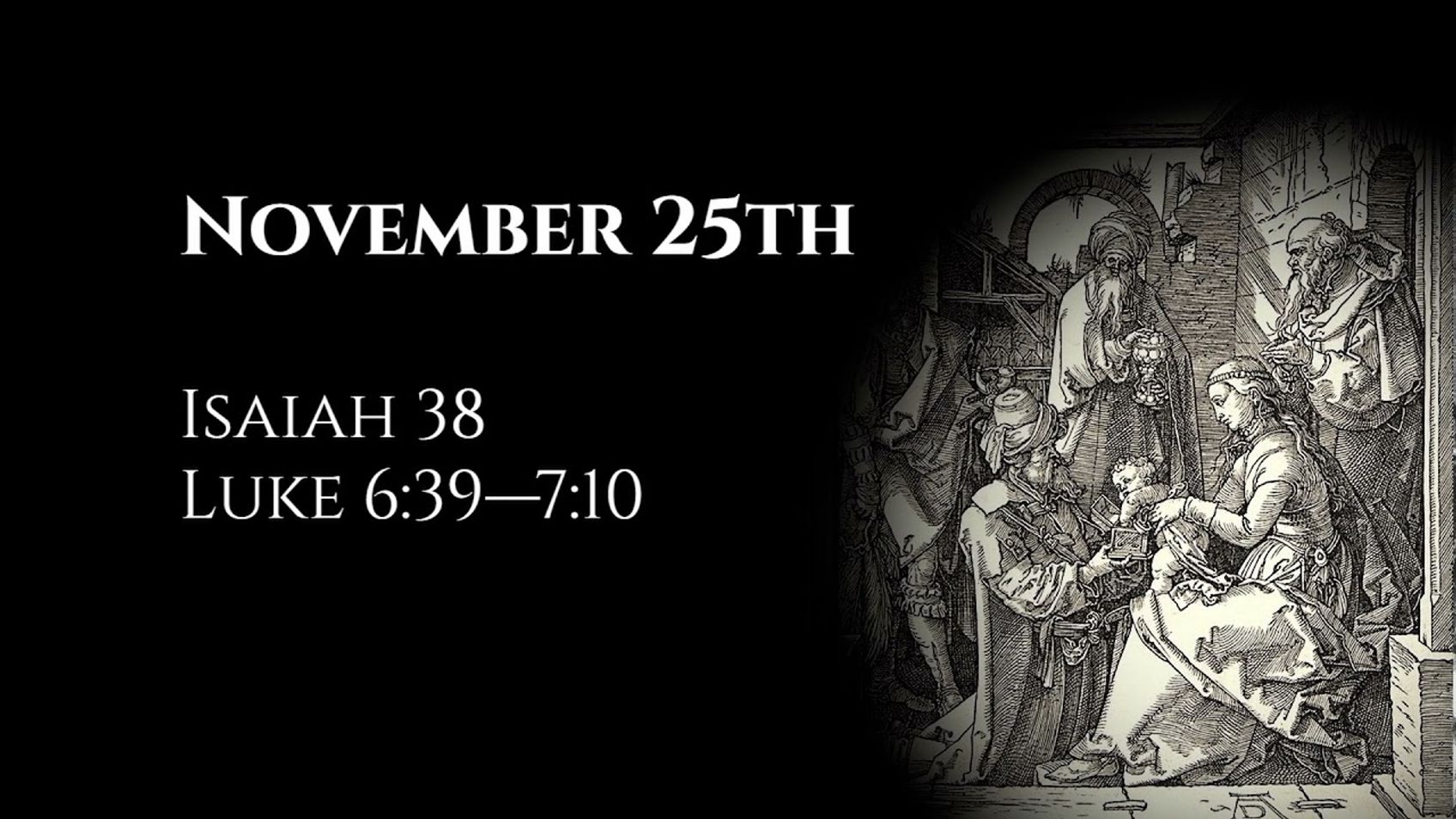November 25th: Isaiah 38 & Luke 6:39—7:10
November 24, 2021

Alastair Roberts
The healing of Hezekiah. The conclusion of the Sermon on the Plain and the faith of a centurion.
My reflections are searchable by Bible chapter here: https://audio.alastairadversaria.com/explore/.
If you are interested in supporting this project, please consider supporting my work on Patreon (https://www.patreon.com/zugzwanged), using my PayPal account (https://bit.ly/2RLaUcB), or buying books for my research on Amazon (https://www.amazon.co.uk/hz/wishlist/ls/36WVSWCK4X33O?ref_=wl_share).
You can also listen to the audio of these episodes on iTunes: https://itunes.apple.com/gb/podcast/alastairs-adversaria/id1416351035?mt=2.
More From Alastair Roberts
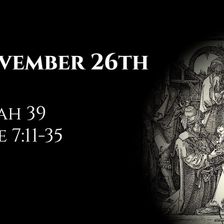
November 26th: Isaiah 39 & Luke 7:11-35
Alastair Roberts
November 25, 2021
The visit of the Babylonian envoys. Messengers from John the Baptist.
My reflections are searchable by Bible chapter here: https://audio.alastairadve
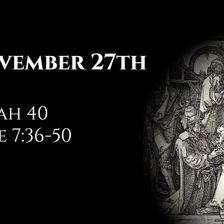
November 27th: Isaiah 40 & Luke 7:36-50
Alastair Roberts
November 26, 2021
Comfort, comfort my people. A sinful woman anoints Jesus' feet.
My reflections are searchable by Bible chapter here: https://audio.alastairadversaria
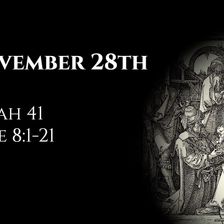
November 28th: Isaiah 41 & Luke 8:1-21
Alastair Roberts
November 27, 2021
Fear not, for I am with you. The Parable of the Sower.
My reflections are searchable by Bible chapter here: https://audio.alastairadversaria.com/expl
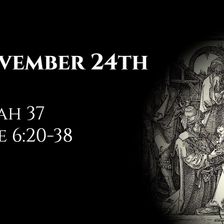
November 24th: Isaiah 37 & Luke 6:20-38
Alastair Roberts
November 23, 2021
The Lord delivers Jerusalem from the Assyrians. The Sermon on the Plain.
My reflections are searchable by Bible chapter here: https://audio.alastaira
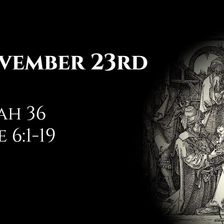
November 23rd: Isaiah 36 & Luke 6:1-19
Alastair Roberts
November 22, 2021
The speech of the Rabshakeh. The Son of Man is Lord of the Sabbath.
My reflections are searchable by Bible chapter here: https://audio.alastairadvers
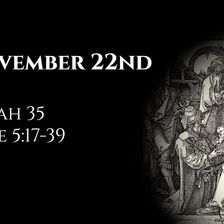
November 22nd: Isaiah 35 & Luke 5:17-39
Alastair Roberts
November 21, 2021
The desert blooming! Jesus challenged by the scribes and Pharisees.
My reflections are searchable by Bible chapter here: https://audio.alastairadvers
More on OpenTheo

An Invitation to the 2026 Coram Deo Pastors Conference
Life and Books and Everything
February 18, 2026
"I love being a pastor, and I love pastors, which is why I hope you will consider joining us at the Coram Deo Pastors Conference in 2026." —Kevin DeYo

Is Greg Placing His Faith in the Wrong Thing?
#STRask
February 12, 2026
Questions about Greg placing his faith in his personal assessment of which truth claims best match reality rather than in the revelation of God in Jes

Why Should We Pray If God Already Knows What’s Going to Happen?
#STRask
January 29, 2026
Questions about why we should pray if God already knows what’s going to happen, how the effectiveness of prayer is measured, and whether or not things

Why Does the Bible Teach You How to Be a Proper Slave Owner?
#STRask
November 13, 2025
Question about why it seems like the Bible teaches you how to be a proper slave owner rather than than saying, “Stop it. Give them freedom.”
* It s

Does God Hear the Prayers of Non-Believers?
#STRask
February 26, 2026
Questions about whether or not God hears and answers the prayers of non-believers, and thoughts about a church sign that reads (as if from God), “Just

How Would You Convince Someone That Evil Exists?
#STRask
November 17, 2025
Questions about how to convince someone that evil exists, whether Charlie Kirk’s murder was part of God’s plan, whether that would mean the murderer d

What Is Wrong with Wokeness? With Neil Shenvi
Life and Books and Everything
January 19, 2026
In this timely interview, Kevin talks to Neil Shenvi about his new book (co-authored with Pat Sawyer), entitled “Post Woke: Asserting a Biblical Visio

Keri Ingraham: School Choice and Education Reform
Knight & Rose Show
January 24, 2026
Wintery Knight and guest host Bonnie welcome Dr. Keri Ingraham to discuss school choice and education reform. They discuss the public school monopoly'

Shouldn’t I Be Praying for My Soul Rather Than for Material Things?
#STRask
February 2, 2026
Questions about whether we should be praying for our souls rather than for material things, why we need to pray about decisions, whether the devil can

The Resurrection Standoff: Licona vs. Ehrman on the Unbelievable Podcast
Risen Jesus
October 22, 2025
This episode is taken from the Unbelievable podcast with Justin Brierly in 2011 when Dr. Bart Ehrman and Dr. Michael Licona address the question: Is t

Is It a Sin to Feel Let Down by God?
#STRask
November 6, 2025
Questions about whether it’s a sin to feel let down by God and whether it would be easier to have a personal relationship with a rock than with a God

What Do You Think About Churches Advertising on Social Media?
#STRask
January 19, 2026
Questions about whether there’s an issue with churches advertising on social media, whether it’s weird if we pray along with a YouTuber, and whether C

Did Jesus Prove He Wasn’t Sinless When He Overturned the Tables?
#STRask
December 29, 2025
Questions about whether Jesus proved he wasn’t sinless when he overturned the tables, whether Jesus’ response to the Pharisees in Mark 3:22–26 was a b

Does Open-Mindedness Require Studying Other Religions Before Becoming a Christian?
#STRask
February 9, 2026
Questions about the claim that if Christians really want to be open-minded, they need to read and study other religions before committing to Christian

Is It Possible There’s a Being That’s Greater Than God?
#STRask
February 5, 2026
Questions about whether it’s possible there’s a being that’s greater than God and that’s outside of God’s comprehension and omniscience, and how to ex
